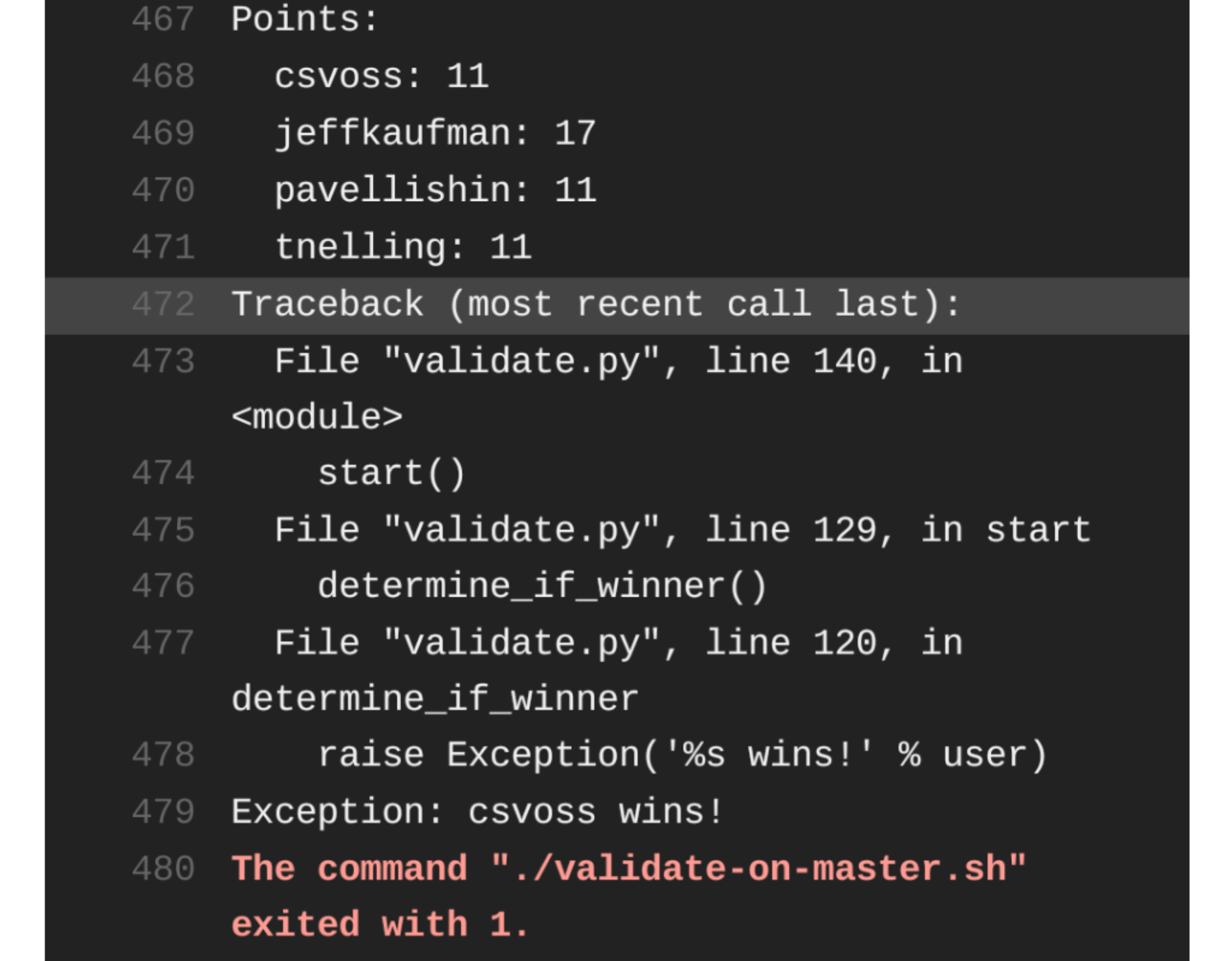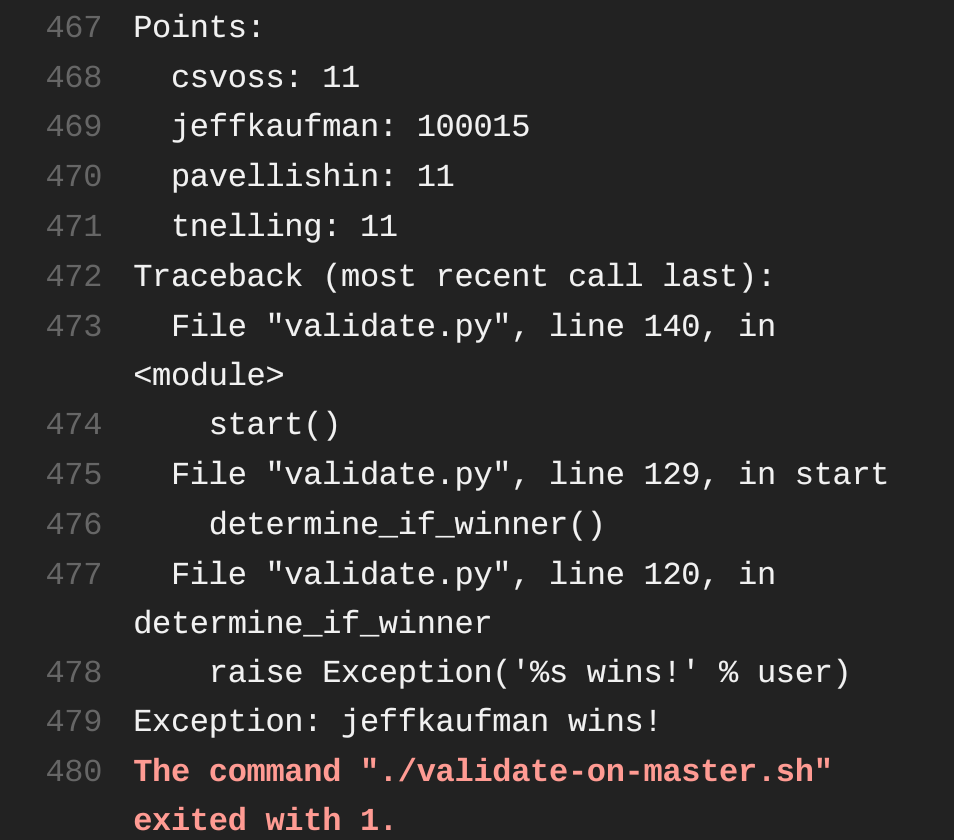Automated Nomic Game 2
I’ve been playing a game of Nomic, where rules are interpreted by a script we edit instead of by the players. This morning Chelsea won our second game of Nomic with a timing attack:
Our game was set to use random numbers to figure out if someone had won. Effectively, each point you earn should give you an additional 1/100000th chance of winning. The source of randomness was python’s random.random(), which was fine.
I had written a PR (#98 to move us to using something derived from the hash of the most recent merge commit on master. I was intending for this to be a timing attack: the merge commit should be predictable entirely from its contents and the current time.
The idea is, I can test for each upcoming timestamp whether there’s hash that would end on me winning. A very hacky way to get git to think it’s in the future is just to set your local clock fast:
CURTIME=$(date +%s) ;
sudo date -s '@1549031338' &&
TZ=America/New_York
git merge tmp-branch
-m "$MESSAGE" &&
sudo date -s '@'$CURTIME
Unfortunately, when I tested trying to exploit this I found that GitHub signs the merge commits it makes. For example:
$ git cat-file commit 182b57a9b53fc31febd9166fc03f3d91e368b64e
tree 04d5ff9335c297c203f4ee4cb5a14006bfa6abb9
parent 0c08b506c96d42d4ad8fab5c2c1701d557aa3a97
parent 6fc74cf39d7d79e8500ef4c4162decd64b82e8be
author Todd Nelling 1549324096 -0500
committer GitHub 1549324096 -0500
gpgsig -----BEGIN PGP SIGNATURE-----
wsBcBAABCAAQBQJcWM9ACRB...yWFgRvF4Ms==2G6+
-----END PGP SIGNATURE-----
Merge pull request #99 from pavellishin/more_verbose_rule_names
Be more vocal about which rule is being run
This meant there was some information in the hash that I couldn’t control, and this wasn’t going to work.
At this point the smart thing to do would have been to delete the PR: if I know it’s dodgy but I can’t exploit it then I shouldn’t let anyone else take that opportunity! But instead I figured “I guess it’s safe, then—nice to have reproducible random numbers” and went to bed.
The next morning I saw that Chelsea had won, and was surprised by the winning commit:
$ git cat-file commit 0003490f8179527499e1b0739fec6d1ac22662f3
tree cc61bc798249f7dbf4d12d139f9c9e3134efa87a
parent 182b57a9b53fc31febd9166fc03f3d91e368b64e
parent 1d6c32eea2556acd67c0b4e193bb4e2639bb487b
author Chelsea Voss 1549380160 -0800
committer Chelsea Voss 1549380160 -0800
Merge pull request #98 from jeffkaufman/consistent-random
start using reproducible random numbers
No signature! Chelsea had noticed that GitHub allows making a local merge and then pushing that up. You can generate a local merge commit for an PR with an appropriate hash by tweaking the timestamp git reads (or waiting for exactly the right time) and then push the merge commit up when you’re ready (her summary).
So Chelsea prepared a vulnerable local commit, approved the PR with a cheeky message, and pushed it up. GitHub accepted the merge, Travis calculated a random number of 0.00005 which was in Chelsea’s win-range, and we had a winner!
It turns out, however, that a merge commit pushed from the command line isn’t checked very thoroughly, and this on its own would have been enough to win. For example, I created a PR (#103) that docked myself a point, which is allowed to be merged without additional approval as a points transfer. Then, once Travis passed it, I merged it from the command line with:
$ git checkout master
$ git merge --no-ff testing-more-local-merges
$ echo 100000 > players/jeffkaufman/bonuses/tons-of-points
$ git add players/jeffkaufman/bonuses/tons-of-points
$ git commit -a --amend
$ git show ae3c5a0
commit ae3c5a01195c351f13d1ae9415e3c7412b92cddb
Merge: 5494d8e 1f73044
Author: Jeff Kaufman
Date: Tue Feb 5 17:20:42 2019 +0000
Merge branch 'testing-more-local-merges'
diff --cc players/jeffkaufman/bonuses/tons-of-points
index 0000000,0000000..f7393e8
new file mode 100644
--- /dev/null
+++ b/players/jeffkaufman/bonuses/tons-of-points
@@@ -1,0 -1,0 +1,1 @@@
++100000
You can see that this let me include extra changes in my merge commit that gave me 100,000 points. Even though the extra change wasn’t in the PR that github ran tests on, I could still push the merge commit up:
$ git push
Counting objects: 6, done.
Delta compression using up to 2 threads.
Compressing objects: 100% (4/4), done.
Writing objects: 100% (6/6), 497 bytes | 0 bytes/s, done.
Total 6 (delta 3), reused 0 (delta 0)
remote: Resolving deltas: 100% (3/3), completed with 3 local objects.
To git@github.com:jeffkaufman/nomic.git
5494d8e..ae3c5a0 master → master
Which made Travis call me a winner, though I’m not since Chelsea had already won:


This prompted the somewhat weird thought:
Has (or should?) anyone use github to actually run an organization’s board?
It’s not quite set up to do so, but it does seem surprisingly close – I could imagine having founding documents on an organization’s bylaws, which board members can propose, review, and approve. You could have rules on PR merging that include “requires a 2⁄3 majority of members of the board.”
People who would like to join are welcome to send a PR